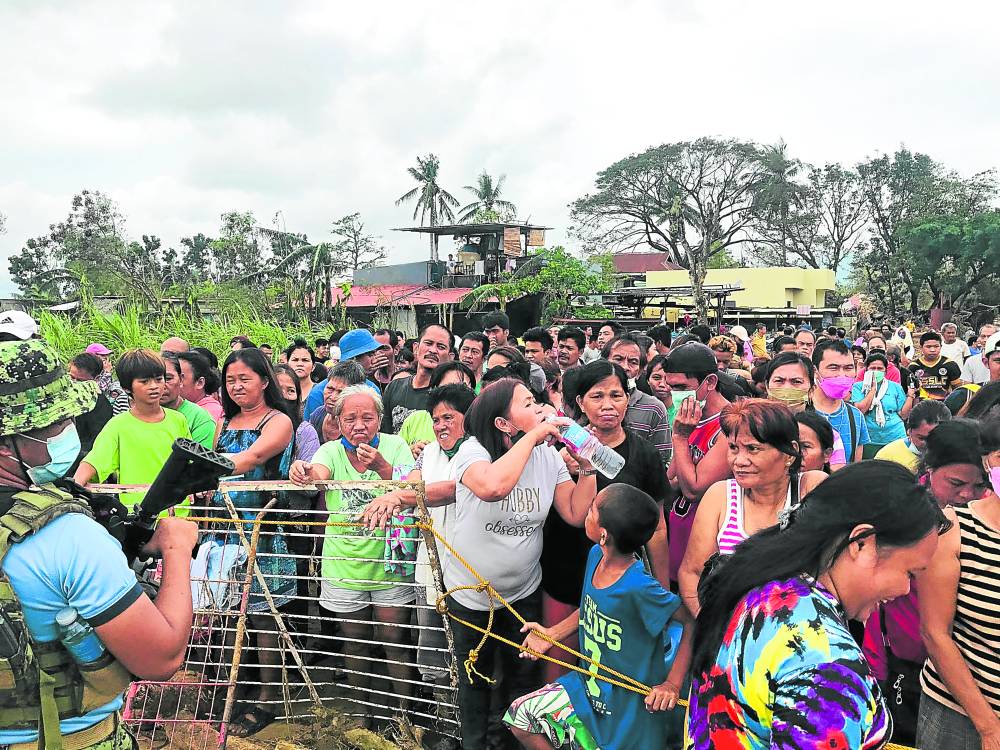
PAINED WAIT Hundreds of residents in Bais City, Negros Oriental province, wait for food and water donations in this Dec. 21 photo. —KARLOWE BRIER
The United Nations and its humanitarian partners on Friday kicked off a campaign to raise $107 million (about P5.35 billion) for more than half a million Filipinos displaced last week by Typhoon “Odette” (international name: Rai).
The biggest Filipino corporations have also been mobilized to raise funds and relief supplies for victims of the strongest and deadliest storm to hit the country this year through the Philippine Disaster Resilience Foundation (PDRF).
In addition to cash assistance and relief goods, these business conglomerates also provided resources and expertise in the aid effort for free—shipping and airline companies delivering food and nonfood items, telecommunications companies setting up emergency calling stations and power distributors sending expert personnel to assist locals in restoring electricity.
According to the United Nations, the Humanitarian Needs and Priorities (HNP) plan was launched to respond to the needs of some 530,000 people in the worst-affected areas, especially in Caraga and Eastern Visayas.
“The HNP calls for US$107.2 million to support the government in responding to the most urgent humanitarian needs for the next six months,” it said in a statement.
UN Resident and Humanitarian Coordinator Gustavo Gonzalez said the response set out in the plan will also prioritize COVID-19 protective measures.
“This is a crisis within a crisis. It happened at the end of the year when the government has been able to keep down COVID-19 infections and inoculated a significant number of the population. We will work with the Department of Health (DOH) to ensure that these hard-won gains are not lost,” he said.
The UN Central Emergency Relief Fund (CERF) is allocating $12 million (P600 million) to United Nations Children’s Fund (Unicef), UN Population Fund, World Food Programme and International Organization for Migration.
CERF is one of the fastest and most effective ways to ensure that urgently needed humanitarian assistance reaches people caught up in crises. CERF’s Rapid Response window allows the UN to kick-start relief efforts immediately in a coordinated and prioritized response when a new crisis emerges.
Aside from the CERF fund, several countries on Friday also provided assistance to the government—Taiwan ($500,000, or P25 million), Hungary (54,000 euros, or P3 million), Singapore ($60,000 or P3 million), South Korea ($2 million, or P100 million in cash and $50,000, or P2.5 million in kind).
Others, including the United States, China, Canada, New Zealand and the European Union, gave financial aid, supplies and pledges of assistance equivalent to about P417.5 million. Still others made commitments to provide aid without immediately stating amounts.
In appealing for more aid, the private foundation PDRF said it preferred cash donations to allow them to procure ready-to-eat food, water, temporary shelter, shelter repair toolkits, hygiene kits, generators, solar-powered lamps, flashlights and fuel.
Donations can be sent via https://www.pdrf.org/how-you-can-help.Corporate entities that are actively providing aid include Jollibee Foods, McDonald’s Kindness Kitchen, San Miguel Corp., SM Foundation, SM Group’s 2GO Group Inc., the MVP Group of Companies, Pilipinas Shell, Coca-Cola Foundation Philippines, Manila Water, Manila Electric Co., Smart Communications, Globe Telecom, Philippine Airlines, Cebu Pacific, Air Asia, Lorenzon Shipping, Consunji Construction and Ayala Corp.
Initial P1B for 6 regions
The Department of Budget and Management (DBM) on Friday said local governments in the six regions placed under a state of calamity will divide among themselves an initial P1 billion in financial assistance from the national government.
The Bureau of Treasury will directly release the money to local government units through their respective authorized servicing banks, the DBM said.
The allotments per region are as follows: Mimaropa, P171.57 million; Western Visayas, P207.25 million; Central Visayas, P188.31 million; Eastern Visayas, P142.5 million; Northern Mindanao, P122.99 million; and Caraga, P167.38 million. These releases were charged against the contingent fund of this year’s P4.51-trillion national budget, the DBM said.
Following major disasters in the past, the United Nations had also called for international humanitarian aid for the Philippines—Supertyphoon “Rolly” (Goni) in November 2020, Supertyphoon “Yolanda” (Haiyan) in November 2013 and Typhoon “Pablo” (Bopha) in December 2012. —WITH A REPORT FROM INQUIRER RESEARCH